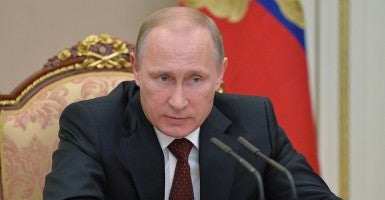NATO recently confirmed that Russian tanks were moving into rebel-controlled eastern Ukraine. But Russia’s aggression under Vladimir Putin didn’t begin in Ukraine and, unless the West stops vacillating, it won’t end there, either.
After the 2003 Rose Revolution, the nation of Georgia, in the Caucasus, became a staunch American ally. But in 2008, it was invaded and partially occupied by Putin’s Russia, and in 2012 its pro-Western president, Mikheil Saakashvili, lost the parliamentary elections.
Since then, Georgia has been governed by a coalition founded by a shadowy billionaire who made his money in Russia. But recently, the Georgian defense minister was fired and its foreign minister quit. Both advocated closer ties to the West. Georgia is drifting into Russia’s orbit.
Next to Georgia are Armenia and Azerbaijan. Armenia, heavily armed by Russia, supports a separatist territory inside Azerbaijan, which is a major oil producer. As Russia also exports energy, it has a lot to gain from threatening Azerbaijan.
Last week, in a sequel to major border clashes in August, Azerbaijan’s military shot down an Armenian helicopter. Armenia is not a mere Russian puppet, but by backing Armenia, Russia perpetuates the conflict and again makes Russian influence felt in the Caucasus.
If Armenia is a problem, Iran is a threat. Russia announced a contract last week to build eight new nuclear reactors in Iran. There is nothing new about Moscow’s nuclear ties to Tehran: Russia completed Iran’s nuclear facility at Bushehr.
Supposedly the new reactors, like Bushehr, will produce only electricity. But the West can’t even monitor Iran’s existing nuclear program; with eight new reactors, monitoring will be far tougher.
The Obama administration badly wants a nuclear deal with Iran. While Russia is a party to the negotiations with Iran, its new nuclear contract seems designed to make the administration’s quest for an agreement look unbearably foolish.
Even if the West gets access to Bushehr, Iran will, thanks to Russia, simply draw new nuclear cards. And by selling to Iran, Russia wins leverage over the West: By creating a threat, it can perversely demand that it must be part of the diplomatic efforts to address that threat.
Nor are the Balkans free from Russian meddling. In late 2013, Montenegrin newspapers reported that Montenegro had turned down a Russian request for a naval base, which Russia apparently wanted because it feared losing its Syrian port at Tartus.
As long as Montenegro has a hope of joining NATO, it is likely to reject Russian requests. But Bosnia is more vulnerable, and Russia has close ties to Republika Srpska, the Serbian part of Bosnia. In March, Milorad Dodik, the Serbian president, met with the Russian foreign minister.
Dodik, the Russians announced, was in Moscow to receive an award from the “International Public Fund of Unity of Orthodox People.” Translation: The Serbs are Slavic brothers, and just like the Ukrainian rebels and the occupied parts of Georgia, they are under Russian protection.
In a recent speech, Putin defended the pact between Adolf Hitler and Josef Stalin that divided Poland and launched World War II. That was both a hint that he is willing to cut a dirty deal with the West and a threat to his neighbors: cooperate with Russia or, like Poland, be divided.
If the West cannot give Russia’s neighbors a better option, they will have to accept Putin’s terms. Putin has the West pegged: We always condemn Russian actions, but invariably, we soon decide it’s time to talk again. The West needs to draw a line and stand by it: No more forgive and forget.
Originally appeared in Newsday.




























